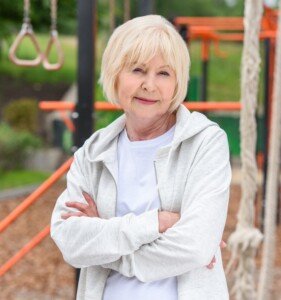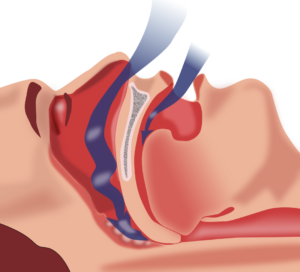
Here’s how to convince your elderly parent, whom you suspect has obstructive sleep apnea, to agree to a sleep study or an overnight oxygen level test.
I was finally able to convince my advanced-elderly father to e-mail his doctor with a request for a home sleep study.
I had brought up the topic of obstructive sleep apnea several times in the past, and it had been like talking to a brick wall.
My father just refused to believe he had sleep apnea, even though:
• Snorer for decades; also sometimes snorted
• Witnessed pauses in breathing
• Daily lengthy naps despite sleeping eight to 10 hours
• Easily falling asleep while watching TV or reading
• Nighttime bathroom trips (nocturia, a classic symptom of sleep apnea)
How to Handle Objections
“I asked my doctor about sleep apnea; he checked me over and says I don’t have it.”
Do not buy this! Either your elderly parent is lying or he/she has a very uninformed doctor.
- There is nothing a doctor can examine during an office visit that rules out sleep apnea!
- Nothing during a throat exam can prove absence of obstructive sleep apnea.
- A questionnaire can’t rule it out, either, especially when many people give inaccurate responses—either deliberate lies to the doctor or unknowingly falsifying information.
An example is telling the doctor, “I never get drowsy driving,” when asked, “Do you ever get sleepy in a car?” The patient conveniently omits the fact that he or she always falls asleep as a passenger!
So if your aging parent claims their doctor “asked me all sorts of questions and concluded I don’t have sleep apnea,” this is as good as having never even seen the doctor at all.
“I don’t stop breathing in my sleep!”
My father wouldn’t believe me when I told him this.
However, his entire demeanor changed once I presented him with a three and a half minute smartphone video of him taking a nap.
More on that coming up, because during the first minute of the video he was still in denial!
“I’m old; I need naps.”
Point out that your parent has excessively napped even in their younger years. This actually did not work with my father, but it might work with your parent.
An objection might be, “I worked hard all day long; of course I had to nap.” You can try something like, “Restorative sleep overnight should eliminate the need for naps even if you worked hard all day at the office.”
You can also point out that naps shouldn’t be two hours. A 20 minute nap can recharge a person. But habitual two hour naps signal a problem.
Discussing excessive naps may plant a seed in their mind that may just start growing.
“I make overnight bathroom trips because I’m on Lasix.”
Lasix is a diuretic that’s given to people with heart failure. It indeed increases urine output.
I pointed out that pre-Lasix, my father was still up overnight using the toilet. He denied this.
Planting the Seed to Convince the Elderly Parent
• Read up on obstructive sleep apnea. Soak up the information like a sponge. You’d better be prepared to answer questions!

Habib M’henni, /Wikimedia Commons
• I’ve written numerous articles about OSA for this site. This required considerable amounts of time reading medical journals. I’ve also interviewed physicians.
As a result I learned enough to answer any question my father could possible have.
• Rehearse your presentation on sleep apnea. In my past broaches of the topic, they were not premeditated; they were spontaneous; this is not an optimal approach.
• Catch your parent when they are relaxed, seated and are not likely to be distracted by other family members.
• Inform other household members that you need 30 minutes alone with Dad or Mom and cannot be interrupted.
• Make sure your parent is in a room with doors that can be closed.
• My father was in his office den. I closed the double doors and sat beside him, pen and pad in hand.
Writing down key features of the presentation, as he sees you doing so, is a powerful tool. I believe this approach was like flooding that seed with water and sunlight.
• Explain the dangers of sleep apnea. I pointed out that my father’s heart disease, heart failure, atrial fibrillation and high blood pressure are complications of untreated sleep apnea.
This pen/pad and private conference approach got him interested enough to ask several medical questions. This was a hopeful sign.
Before you give your presentation, practice it in your head so that during the presentation, you cover everything so that at the end, your parent doesn’t stick you with multiple objections.
My father stuck me with an objection. I had forgotten to bring it up during the presentation. If you bring it up FIRST, this strengthens your position!
You must beat them to the punch. I did that with everything except the Lasix part.
I meant to explain that if someone does NOT have obstructive sleep apnea, Lasix should not cause them to use the toilet four times a night.
When my father challenged me about the Lasix, I admitted I’d forgotten to mention it, but then addressed the issue.
I then pointed out, “But let’s suppose it IS the Lasix that forces you out of bed four times a night to urinate. So what. You still have all these other classic symptoms of obstructive sleep apnea.”
Patiently answer all questions. Never show frustration or anger.
“You’re not a doctor. Don’t tell me what I have.”
You can avoid this objection by BEGINNING your presentation with something like:
If an obese person, while eating a pile of junk food, is preaching to a thin youngster the importance of a heart healthy diet…is he any less correct than a marathon-running cardiologist giving the same advice?
Then add, “Do I need to be a meteorologist to know that rain comes from clouds?”
“OF COURSE NOT. That’s because FACTS ARE FACTS. It doesn’t matter who the messenger is.”
This preface to your presentation is almost a guarantee that your elderly stubborn parent won’t stick you with, “What do YOU know; you’re not a doctor!”
At the conclusion of my presentation my father was still not convinced to have a sleep study. By the way, make sure they know they can have the sleep study at home.
A week later I took a video of my father napping. It clearly showed pauses in breathing lasting 35 seconds, followed by erratic noisy breathing.
I prefaced the video by telling my father I loved him. I made sure he was in a relaxed, neutral state of mind before broaching the topic.
I did not tell him what the video was. I only said, “I have to show you a video that might change your life.”
I must have spoken too much because he interjected and guessed what the video was about. He then said he didn’t want to see it.
I calmly presented it anyways.
Amazingly he at first denied the very apparent apnea. He said he was a naturally shallow breather.
I said, “But you’re NOT breathing. Keep watching. There is NO movement whatsoever.”
He said he was breathing because his mouth was moving. I put my thumb over the screen to conceal his mouth.
After a few more words of denial he then grew silent as the video progressed.
At the end I offered to answer any questions but did not mention CPAP. I did mention a home sleep study.
I said, “Take things one step at a time. The next move is to contact your doctor and ask for a home sleep study. Don’t think beyond that point. Just ask for the home sleep study.”
You must anticipate what your elderly parent might think upon viewing a video of their sleep apnea.
I anticipated that my father would wonder where the hell he got it from since he’s not overweight or a smoker.
I didn’t wait for him to ask; I volunteered the explanation (naturally small airway/jaw/chin).
You must also anticipate that Dad or Mom will think, “Why bother at all? I’m old and don’t have much time left.”
Well, here’s a brilliant pre-emptive response. Don’t wait for them to bring this up.
I volunteered, “In case you’re thinking you’re too old to benefit from treatment…” (don’t say CPAP or “mask”; say “treatment”), there is one complication from untreated sleep apnea that you have NOT had yet.”
Pause. Let that sink in. Then continue, “That complication is a fatal heart attack during your sleep. Sudden cardiac arrest. Treatment will go a long way at helping to prevent that.
“Plus, treatment will immediately make you feel so much perkier and awake throughout the day, and not feel so sleepy all the time—and that benefit alone is worth treatment.”
MASKS!
Be prepared to answer questions about CPAP. My father began asking about masks.
I was able to describe the three basic designs. Be prepared to explain exactly HOW CPAP WORKS and why supplemental oxygen alone is not effective for OSA.
I offered to frame the email message to my father’s doctor. Not long after, he told me, “Okay, write the letter and send it to me.”
Stay calm. Don’t blurt, “It’s about time you realized you have sleep apnea!” Or, “Finally! You realize you were wrong!”
I simply said, “I’ll compose it this evening and send it to you.” And I did. The next day my father confirmed he had sent the message to his primary care doctor.
I’m not sure that if the video had been my FIRST attempt to convince my father to get a home sleep study that it would have worked.
The delay was caused by me not having a smartphone; I had borrowed a family member’s phone.
My previous attempts to get my elderly father to agree to a home sleep study had primed him, so that by the time he saw the alarming video…he was convinced that he was not breathing for long periods.
 Lorra Garrick has been covering medical, fitness and cybersecurity topics for many years, having written thousands of articles for print magazines and websites, including as a ghostwriter. She’s also a former ACE-certified personal trainer.
Lorra Garrick has been covering medical, fitness and cybersecurity topics for many years, having written thousands of articles for print magazines and websites, including as a ghostwriter. She’s also a former ACE-certified personal trainer.








































